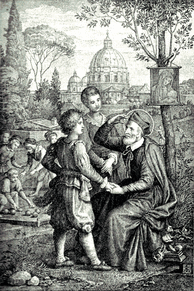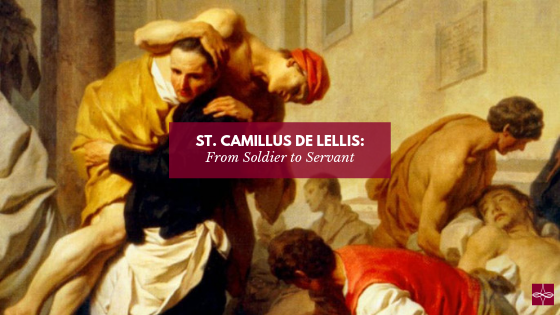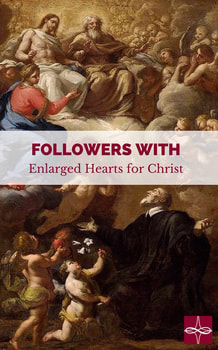|
While growing up, I remember seeing “Rejoice in the Lord always” (Phil 4:4) on the fridge every time I walked by. While telling my mom about this blog post, she said, “You have permission to use Philippians 4:4.” I joked, “I didn’t realize you had that verse trademarked.” This jovial interaction represents the joy of one of the saints we celebrate this week: St. Philip Neri. He’s known as the patron saint of joy. St. Paul’s Letter to the Philippians is known as the Epistle of Joy, so it’s fitting to see his name in PHILIPpians! What is joy? The secular use of “joy” is typically synonymous with “happiness.” Happiness is subject to what’s happening around you. Joy, on the other hand, is subject to our free will in choosing to abide in God’s grace. In this state of grace, joy can be equated with love (or divine charity). Happiness and sadness are opposed to one another, while joy and sorrow can be held together, even though they appear to be in tension. Our hearts can be filled with sorrow for what breaks God’s heart while still “entering the joy of the Lord” (CCC 1720). The reason we can have joy in this world is because “God doesn’t abandon His creatures to themselves. He not only gives them being and existence, but also…sustains them. Recognizing this utter dependence on God increases our wisdom, freedom, joy, and confidence” (CCC 301). “True happiness is found in God alone” (CCC 1723). How can joy help us connect with others? According to an article from the National Catholic Register, St. Philip “was known to show up to important events with half his beard shaved, give incorrect walking directions to his disciples, and read a book of jokes.” He believed that these behaviors helped him to connect with other people through being present and humble. He taught that “a joyful heart is more easily made perfect than a downcast one.” St. Paul used joy in his evangelical efforts as well. He was fully aware of the brokenness in his story, and he couldn’t keep God’s grace to himself. Love changes us and spreads like wildfire. St. Paul was knocked off a horse and given a new name. He went from threatening Christians with death to causing Christian conversions that brought new life. St. Philip became known as the “Apostle of Rome” and earned the respect of believers and non-believers because of the joy he exuded. His heart was physically enlarged because of his love and faith in the Lord…so much so that his ribs were broken! Love has no room for fear. One of the most common fears is public speaking. Something that St. Philip and St. Paul did not fear was sharing the faith with people they encountered. They were missionaries of love passionately sharing the love of God that they discovered richly in their own lives. St. Philip said, “God doesn’t ask us to do the impossible. He asks us to do what is possible with God’s grace.” How can we find joy in the face of evil in the world? In the last days leading up to His passion, Jesus said, “So you also are now in anguish. But I will see you again, and your hearts will rejoice, and no one will take your joy away from you” (Jn 16:22). In the wild times we live in, joy sometimes can be hard to find. Discouragement and confusion are often tools of the devil as he tries to distract us from this promise of Christ: joy can ALWAYS be ours. Jesus used the most unimaginable instrument of torture as the awesome instrument of salvation. On Good Friday, the Devil thought he won. On Easter Sunday, God turned the Cross into a gift. If you want to confuse the devil, be joyful. When St. Paul was imprisoned in Rome, one could think his ministry would cease. Instead of giving into discouragement, St. Paul wrote the Epistle of Joy to the people of Philippi thanking them for the blessing that they were to him and encouraging them in their faith. St. Paul stared death in the face a number of times before his beheading in Rome, but we don’t have to have these dramatic experiences to embrace our mortality. St. Philip suggests that we “prepare for death and live each day as if it were our last. Fill up days with goodness and don’t let them be squandered.” When asked what time it was on his deathbed, St. Philip said, “It’s eight… in an hour it’ll be nine, then ten, eleven, and midnight.” His companions responded by giggling before going to sleep. His legacy even in his last moments is joy! How can we be apostles of joy today? St. Philip suggests, “Have all the fun you want, but just don’t offend God.” He also suggests, “Cast yourself into the arms of God and be very sure that if He wants anything of you, He will fit you for the work and give you strength.” St. Paul says, “Rejoice in the Lord always. I will say it again: Rejoice! Let your gentleness be evident to all. The Lord is near. Do not be anxious about anything, but in everything, by prayer and petition, with thanksgiving, present your requests to God. And the peace of God, which transcends all understanding, will guard your hearts and your minds in Christ Jesus” (Phil 4:4-9). Let us ask the Holy Spirit to fill us with an abundance of the spiritual fruit of joy! We pray for the intercession of St. Philip and St. Paul to show us how to radiate joy no matter the circumstances around us. St. Philip Neri, patron saint of joy, pray for us! St. Paul the Apostle, writer of the Epistle of Joy, pray for us!
0 Comments
Today is the feast day of St. Camillus de Lellis. St. Camillus de Lellis was an Italian saint who suffered much from a young age. His mother died during his infancy and he was ignored by his father during his upbringing. Throughout Camillus’ life, he also suffered from a leg sore that he developed at age 17. Camillus served as a soldier and had a violent gambling addiction. By the time he was 24, he had gambled and lost everything he owned—down to the shirt on his back. After having a conversion while staying at a friary of Capuchins, Camillus attempted to join the order multiple times, but was denied due to his leg sore. He spent much of his life in the San Giacomo Hospital for the Incurables caring for the sick and suffering. After receiving advice from his spiritual director, St. Philip Neri, Camillus studied for the priesthood and was ordained a priest at the age of 34. Camillus’ dedication to caring for the sick drove him to begin his own congregation dedicated to serving the sick in hospitals, those inflicted by the plague, and men injured in war. His order came to be known as the Order of the Ministers of the Sick, or simply as the “Camillians.” He is quoted as saying, "If no poor could be found in the world, men ought to go in search of them, and dig them up from underground to do them good, and to be merciful to them." Camillus spent his years in service to others, despite his own physical sickness, and died serving the sick. Camillus is the patron saint of nurses, those who are ill, and those with gambling addiction. I heard on a Catholic podcast that the beauty of saints is that when we ask for their intercession, when we ask them to pray for us, we are asking them to do the praying for us, to pray on our behalf. In a world filled with sickness and suffering, St. Camillus is a saint who can pray for us. Today on Camillus’ feast day, how can you ask for his prayers? Do you have a family member who is struggling with addiction? St. Camillus, pray for us. Are you or a family member suffering from sickness? St. Camillus, pray for us. Do you need hope and inspiration in your ministry? St. Camillus, pray for us. This time of the New Evangelization in the Church is beautiful: all the faithful are called to spread the love of Christ to the hearts of modern men and women. While the term New Evangelization, though beautiful, has become almost overused, common jargon within the Church, we are called to the radical joy and love the New Evangelization promotes. The task seems lofty at first glance. With controversies of all sorts in society today, the charge to love like Christ is even greater. However, the Body of Christ has been in trying times throughout the ages, and it’s the ability of holy men and women to magnanimously love that makes a difference in society. Today, the Church celebrates a saint that is a perfect example for the faithful of living out the call of the New Evangelization: St. Philip Neri, the Apostle of Joy. St. Philip Neri, a radical saint of the 16th Century, was known for his humility, obscure and hilarious means of mortification, pastoral care, humor, and charm. The legend and stories of St. Philip Neri are plentiful and cannot all be spoken of in this short post, but his charity is worth mentioning for those who are attempting to live out the call of the New Evangelization. Philip was known to have a strong devotion to the Holy Spirit. At the age of 29, before the feast of Pentecost, Philip was praying for a special outpouring of the Holy Spirit when he saw a globe of fire enter his mouth, move down his chest, and travel to his heart. At that moment, Philip experienced an immense amount of joy, as if his heart had expanded. The saint had been filled with the love of God! Throughout the rest of his life, when Philip was ministering to people in the confessional, celebrating Mass, or performing acts of charity, his heart would violently palpitate. Oftentimes, Philip would embrace his penitents and hold them close to his chest. The faithful would receive an immense amount of consolation from the embrace and this practice became known as “the most effective way of being delivered from temptation.” St. Philip Neri was known as the Apostle of Joy because his aim was love, and the Holy Spirit, the Flame of Love, was the driver in his mission. Philip died at the age of 80, dedicating his entire life to mercy, love, and joy. The many stories that follow him affirm that claim. He was dedicated to the Sacrament of Confession and would be available for Confession at all hours. Dispensing the mercy of Christ, Philip spent his last day on this side of heaven hearing confessions from the people he served and loved. Those he ministered to claim they could not be sorrowful or depressed around Philip; he exuded a constant flow of Christ’s joy. During an evaluation to determine Philip’s cause of death, the examiner found Philip’s heart to be twice the size of an average heart, causing the ribs around the heart to break and curve out. The love of God had been made manifest physically within him. Today could you imagine a Church with followers whose hearts, like Philip’s, are enlarged with love for neighbor? This is the call of the New Evangelization—to spread Christ’s fragrance of love everywhere, “for we are the aroma of Christ” (2 Cor 2:15). The Church is in a unique time. Our intellectual arguments often mean little, but our actions and witness of love are powerful. The New Evangelization calls us to be little Apostles of Joy. Wherever we are and wherever we go, we are to love. Cardinal Ratzinger explained that evangelization is teaching people the path to happiness. “To evangelize means: to show this path—to teach the art of living,” he said (Address to Catechists and Religion Teachers, 12 December 2000). St. Philip Neri taught those around him the art of living a joyful, humble life, motivated by the love of Christ. To live the New Evangelization, we are to have a heart like his, witnessing and walking with others and teaching the art of living. The Body of Christ must be propelled by the love of God. Today, let us invite the Holy Spirit into our hearts in a deeper way so we might gain a greater capacity to love like our joyful friend, St. Philip Neri. May we be a people of love with enlarged hearts for Christ, spreading joy to all. “The love of God makes us do great things.” –St. Philip Neri For more resources on the New Evangelization, click here.  St Philip Neri whose feast we celebrate today is known as the Apostle of Joy and as the third Apostle of Rome. Throughout his ministry in Rome, he stressed the importance of joy in the life of a disciple of Christ. His own joy and humility attracted people from every walk of life to him and ultimately Christ. St. Philip was born in Florence in 1515. Born to an affluent family, he forfeited a promising career in business with his uncle in order to move to Rome in 1535. While in Rome as a layman, Philip would immerse himself in prayer during the night at the catacombs and during the day would care for the sick in the overcrowded hospitals and the pilgrims. Philip developed a following in Rome who wanted to imitate his example and was reluctantly ordained to the priesthood in 1551. Philip and this group that he attracted would “meet informally for prayer, discussion, and recreation together, before going off to minister to the needy.” They became known as the Oratorians and helped to re-evangelize Rome. While we celebrate St. Philip Neri’s feast today it is helpful to examine a few reasons as to why his charism is as relevant today as it was in the 16th century. Firstly, St. Philip’s ministry was characterized by its relational approach. He evangelized one on one. During the Carnivale in Rome which brought much disgraceful behavior with it, St. Philip went out in the city and organized events to counteract the Carnivale. He was willing to go out and meet people were they were at. He first built relationships with people and then invited them into a deeper relationship with Christ. He was able to achieve this and build so many relationships because his ministry was characterized by joy and humility. For St. Philip, joy and humility were both integral parts of the Christian life and inseparable from one another. He repeatedly said, “Cheerfulness strengthens the heart and makes us persevere in a good life. Therefore the servant of God ought always to be in good spirits.” People were attracted by his joy and authenticity and wanted to experience it for themselves. Also, St. Philip who was only ordained later on life, emphasis the role of the laity in the Church. He believed holiness was attainable for the laity and was a proponent of frequent communion and confession, himself spending hours a day in the confessional. The laity were not treated as a third order, but as a first order. The Oratory existed to serve the needs of the laity who were living in Rome. St. Philip Neri’s example should inspire us to always joyfully seek a deeper relationship with the Lord. He reminds us that we are called to holiness and he is a model for the New Evangelization. St. Philip understood we will not attract people to Catholicism if we do not exhibit the joy that is a result of our relationship with Christ. Conor Boland is a College Ministerial Intern for One Bread One Cup, at Saint Meinrad Seminary & School of Theology and is an undergraduate at The Catholic University of America.
|
Details
Archives
July 2024
Categories
All
|
About |
Media |
© COPYRIGHT 2024 | ALL RIGHTS RESERVED







 RSS Feed
RSS Feed